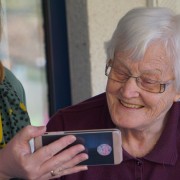Skilled Nurses Living vs Assisted Living Facilities
Selecting the right residential environment for a senior that you love can be very involved. With so many residential types, fee structures, and potential benefits, finding the right place can quickly become a discouraging and confusing process. It is important to continue to research and learn as much as you can about what place is the best fit for you and your family. Sometimes the best way to understand one option is to compare it to another one. This article will seek to compare and contrast ALF (assisted living facilities) and SNL (skilled nurses living).
Differences Between Skilled Nurses Living & Assisted Living Facilities
Skilled Nurses Living |
Assisted Living Facilities |
| 1. Provides a safe environment for someone who has significant medical needs such as a ventilator, IV or medication. | 1. Provides a safe environment for someone who needs only help with daily living activities such as dressing, bathing, walking, etc. |
| 2. This is a medical living setting. It often takes place in a rehabilitation facility or nursing home. | 2. This is a more residential setting. |
| 3. These facilities are required to have a registered nurse on site for at least 8 hours a day, 7 days a week. | 3. ALF have licensed practical nurses and/or registered nurses accessible and on-call, but they are not required by law to be on-site. |
| 4. Usually SNL is short term. | 4. ALF are more of a long-term plan for care. |
| 5. The goal is to provide more short term care in hopes of returning to more individualized living. | 5. The goal is to provide an individual with as much independence as he or she desires, while assisting with tasks like bathing, dressing, and meal preparation (among others). One option isn’t better than the other; both serve a unique purpose based on current need. |
| 6. Because skilled nursing exists to help individuals following a hospitalization or sudden decline in health, it typically involves constant monitoring and round-the-clock medical care. | 6. Residents of assisted living enjoy great freedom –entirely in control of their schedules – deciding how often and to what degree they need or want assistance. |
| 7. The cost is higher due to 24 hour care that is provided. | 7. Costs are less per month, however it is more of a long-term solution. |
| 8. SNL is likely to be covered by insurance. | 8. ALF is not likely to be covered by insurance, but can be covered by long-term care plans if an individual has one in their insurance plans. |
There are benefits and drawbacks to both options and the best fit will differ for each family. The most important thing to consider is what you or a loved one needs. Orchard at Brookhaven is happy to help walk you through this process of decision making. If you need help deciding or would like more information, please contact us today.










